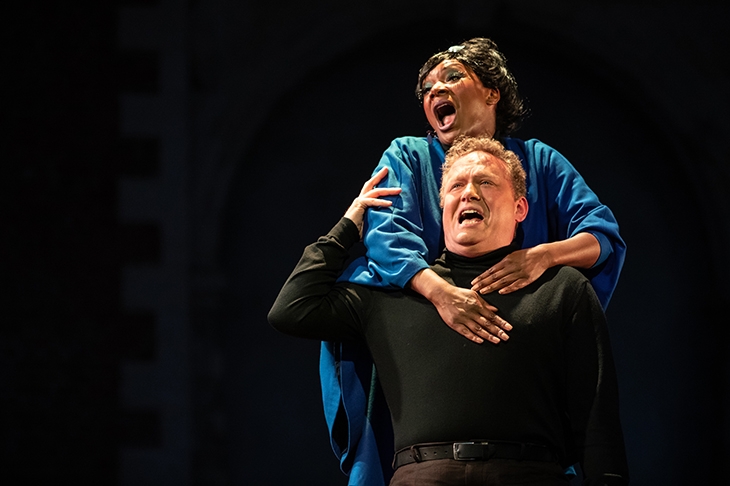Where was the desire, the frisson, the flicker of attraction? Hell, where was the sex? I ask because a week spent at the seedier end of the romance spectrum has left me feeling profoundly unsatisfied. Two classic femmes fatales — Puccini’s convent-girl manqué Manon Lescaut and Janacek’s dark-eyed gypsy Zefka — had their chance to beguile and blew it. There was disquiet, revulsion, confusion and a certain amount of modish awkwardness, but the itchy urgency of it all was absent — the emotional ignition without which neither Manon Lescaut nor The Diary of One Who Disappeared can find their flame.
A chilly night launched Opera Holland Park’s 2019 season, and there wasn’t much more heat coming from the stage. Puccini’s first operatic success isn’t the easy, affable tragedy we get from La bohème or Madame Butterfly. There are rougher edges to both an opera and a heroine that are still under construction, works in progress. In the original novel, Abbé Prévost’s Manon is a brittle teenager, all greedy eyes and sharp elbows. Clothed in Puccini’s ravishing score she softens into dangerous pathos — a trick you know is coming, but whose sleight of hand always catches your breath.
Director Karolina Sofulak relocates the action to 1960s Paris — all Gitanes, Mary Quant mini skirts and ill-advised games of Twister. George Johnson-Leigh’s designs reach for a contemporary demi-monde — a bit sexy, a bit sleazy — but fail to grasp it, and the relentless ugliness and tackiness soon pall. ‘Our goddess is hope’ the barman sings at the start, but if Manon’s only choice is between the convent and what looks like the lowest rung of sex slavery (her dancing lesson becomes a provocative photo shoot in her disturbingly infantilised pink-and-spangly bedroom), then hope is an illusion.
Love, too, is in doubt. Sofulak keeps her lovers, Manon (Elizabeth Llewellyn) and Des Grieux (Peter Auty), at arm’s length throughout. They sing of passion, but stand well back, his very mature student generating nothing close to chemistry with Llewellyn’s vivacious woman-child. Is nothing real in this polyester and dipped-pearl fantasy? Probably not. The trouble is that Puccini’s starry-eyed score disagrees so violently that you find yourself torn constantly between the two.
There are similar tensions in the performance of the music here. Llewellyn’s Manon (still recovering from laryngitis, we were told) is ermine and pearls, soft but deliciously heavy in the ear. Auty’s voice, by contrast, has a peevish brilliance that can turn this hero querulous when he should be impassioned. Paul Carey Jones makes an intriguing deviant of Manon’s unscrupulous brother, but there’s a serious lack of youth, of élan, from Peter Robinson’s pit which, coupled with some dodgy ensemble moments, pins this butterfly of a score firmly to the floor.
Love is both theme and inspiration for Janacek’s 1921 song cycle The Diary of One Who Disappeared. The composer, fired up with feelings for the married, much-younger Kamila Stosslova, bombarded her with letters and music, including the cycle, whose seductive gipsy-girl Zefka lures young Janicek away from his respectable family to live with her on the margins. The piece is an odd one. Scored for tenor and piano, it also demands a mezzo-soprano and three further female voices, heard at a distance. Inherently dramatic (characters enter and exit at fixed points), it has long been a target for directors, most recently Belgium’s most successful cultural export Ivo van Hove.
Van Hove has a clinician’s interest in sex, and his staging, which visited the Royal Opera House’s Linbury Theatre as part of an international tour, is a meticulous dissection of the central love affair But that’s the trouble; van Hove peels away skin rather than clothes, bypassing the erotic tug and surge of the piece to go straight to the anatomical structures below.
Janacek’s songs are heady with birdsong and flowers, woody smells and the soft bracken that is Zefka’s ‘bed’. Van Hove’s staging comes dressed in business-casual, perfumed by the coffee percolating on the side of a chic studio-apartment, soundtracked by the mechanical whirring of a projector. Urban ennui replaces bucolic desire in the memory-play the director has crafted in and around the work.
Janacek’s 22 songs have additional music by Annalies Van Parys, giving new voice to the object-of-desire Zefka. Though appealing in themselves, these episodes are just one of several complicating new elements — an elderly double for Janicek (Father? Older self?); a disembodied voice from a gramophone; words from Janacek’s own writings added as a coda — that muddy the situation. It’s hard to feel much when you’re so busy thinking, assessing and recalibrating.
Ed Lyon makes an ardent lover, oaky and textured in tone right up to the bright top of the voice. Marie Hamard is cooler, more inscrutable musically, her mezzo occasionally ringing a little shallow. Anchoring it all is pianist Lada Valesova, whose light-touch clarity and unobtrusive inflections open up a world that van Hove’s cluttered storytelling only obscures.
Manon Lescaut
Opera Holland Park, in rep until 26 June
The Diary of One Who Disappeared
Linbury Theatre






Comments